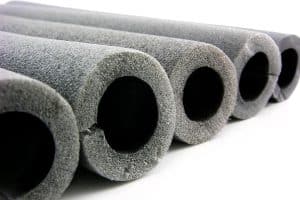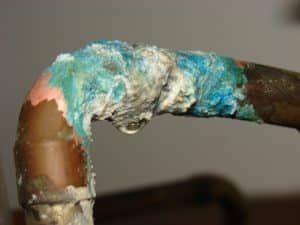A burst pipe is one of the worst and messiest plumbing repair problems. It causes damage to your plumbing and also the surrounding area. This can lead to costly repairs and a lot of stress. While not all plumbing problems can be prevented, a lot of them can be by forming good habits when it comes to your plumbing and staying up to date on maintenance. A burst pipe often catches people off guard, however knowing what causes a pipe to burst and taking the proper steps to reduce your risk can save you a lot of stress, time, and money. Here are the leading threats to cause a pipe to burst.
Freezing Temperatures
Freezing temperatures can have a negative effect on your plumbing. When water freezes it expands, when it expands inside of your pipes, it can cause a pipe to burst. To prevent this from happening it is important to winterize your plumbing.
- Insulation – Start by making sure all exposed pipes have the proper insulation. They also make insulating jackets for water heaters. This can protect your water heater and help it run more efficiently.
- Air Leaks – Check for air leaks in attics, basements, and crawl spaces. You will also want to make sure you detach and stow away your garden hose.
- Leave Taps Open – An open tap can help relieve the pressure that builds up inside of your pipes.
- Stow Your Hose – A hose that is attached to the spicket, can enable water to travel back into your pipes, where it can freeze.
- Shut Off Water Supply – If you are going out of town, or have any vacant property, make sure you shut off the water supply and drain all of the lines.
- Leave The Heat On – Maintaining warmer temperatures in your home can also help.
- Heat Tape – If you notice your pipes suffering during a severe drop in temperature, try wrapping some heat tape around your pipes.

Clogged Drain
A clogged rain is another problem when it comes to burst pipes. If you have an obstruction that is preventing the flow of water, a lot of pressure can build up inside of your pipes. If the water cannot pass, it will look for another place to go. This sometimes results in a back up issue, however it can also lead to a burst pipe. It is important to act quickly if you notice a clog, not just to restore the functionality of your plumbing, but to reduce the pressure and protect your pipes.
High Water Pressure
High water pressure can be devastating to your plumbing fixtures. It causes damage to your appliances, and you may find yourself making more frequent repairs. High water pressure can also cause a pipe to burst or leak. If water comes shooting out of your faucet, you may want to check your water pressure to protect your plumbing. Residential water pressure should be no greater than 80 psi. Anything over, and you run the risk of damage. To combat high water pressure you need a pressure relief valve. If you already have one, it may need to be replaced.
Corroded Pipes
Corrosion is your pipes worst enemy. It is only natural that sediment builds up over time. Mineral deposits occur naturally in water. In some areas there is an abundance of minerals like calcium and magnesium that can cause your pipes to corrode faster, especially if you have old galvanized steel pipes. When pipes corrode, they become brittle. This leaves the susceptible to shifting ground that can be caused by earthquakes or heavy rains. If a sewer pipe bursts it can make a huge mess. So it is important to do what you can and protect your pipes from corrosion. A water softener can significantly reduce the amount of mineral deposits in your water. Regular drain cleaning can also reduce the amount of build up over time.

Need to catch up on your plumbing maintenance? Lesco Plumbing, Heating, and Cooling is here to help! Schedule your plumbing maintenance today!
Related Articles
Why You Should Think Twice Before Using Liquid Drain Cleaner
Pet Friendly Plumbing Tips – Protect Your Plumbing and Your Furry Friends







